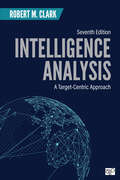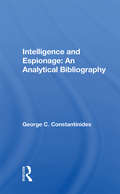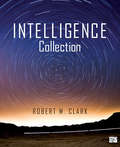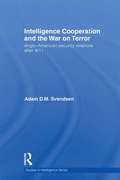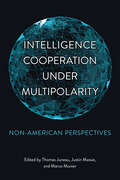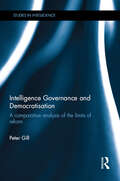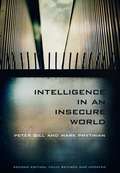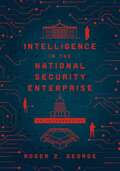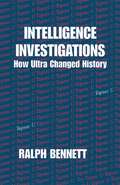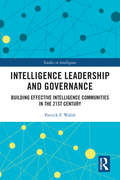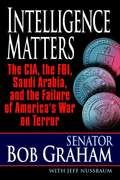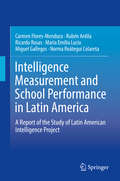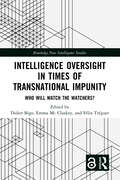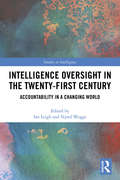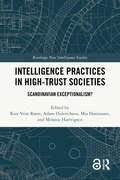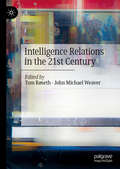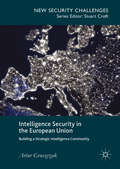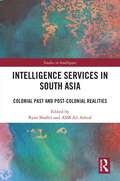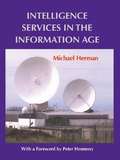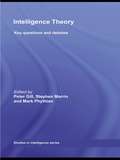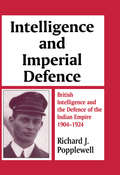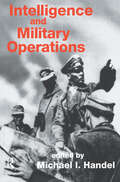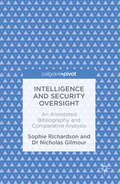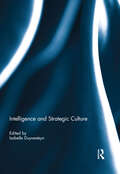- Table View
- List View
Intelligence Analysis: A Target-Centric Approach
by Robert M. ClarkNow in its Seventh Edition, Robert M. Clark′s Intelligence Analysis: A Target-Centric Approach once again delivers a consistent, clear method for teaching intelligence analysis, demonstrating how a collaborative, target-centric approach leads to sharper and more effective analysis. In addition to looking at the intelligence cycle, collection, managing analysis, and dealing with intelligence customers, the author also examines key advances and emerging fields like prescriptive intelligence. Through features like end-of-chapter questions to spark classroom discussion, this text combines a practical approach to modeling with an insider perspective to serve as an ideal and insightful resource for students as well as practitioners.
Intelligence And Espionage: An Analytical Bibliography
by George C ConstantinidesThis pioneering work, based on many years of reading and research and ranging mainly from the seventeenth century to the present, breaks new ground in intelligence bibliography. It is the most comprehensive and thorough bibliography of English-language nonfiction books on intelligence and espionage to date. The in-depth analytical annotations deal
Intelligence Collection
by Robert M. ClarkThis comprehensive book by one of the foremost authorities in the field offers systematic and analytical coverage of the "how and why" of intelligence collection across its three major stages—the front end (planning), collection, and the back end (processing, exploitation, and dissemination). The book provides a fresh, logical, and easily understandable view of complex collection systems used worldwide. Its ground-breaking organizational approach facilitates understanding and cross-INT collaboration, highlighting the similarities and differences among the collection INTs. The first part of the book explains how the literal INTs—open source, human intelligence, communications intelligence, and cyber collection—work. The second part focuses on nonliteral or technical INTs including imagery, electronic intelligence, and measurements and signatures intelligence. All chapters use a common format based on systems analysis methodology, detailing function, process, and structure of the collection disciplines. The third part is a complete chapter discussing the complexities of collection management in the United States. Rich, full color illustrations accompany the text with examples throughout the book on topics as diverse as battlespace situational awareness, terrorism, weapons proliferation, criminal networks, treaty monitoring, and identity intelligence.
Intelligence Cooperation and the War on Terror: Anglo-American Security Relations after 9/11 (Studies in Intelligence)
by Adam D.M. SvendsenThis book provides an in-depth analysis of UK-US intelligence cooperation in the post-9/11 world. Seeking to connect an analysis of intelligence liaison with the wider realm of Anglo-American Relations, the book draws on a wide range of interviews and consultations with key actors in both countries. The book is centred around two critical and empirical case studies, focusing on the interactions on the key issues of counterterrorism and weapons of mass destruction (WMD) counter-proliferation. These case studies provide substantive insights into a range of interactions such as 9/11, the 7/7 London bombings, the A.Q. Khan nuclear network, the prelude to the 2003 Iraq War, extraordinary rendition and special forces deployments. Drawing on over 60 interviews conducted in the UK and US with prominent decision-makers and practitioners, these issues are examined in the contemporary historical context, with the main focus being on the years 2000-05. This book will be of much interest to students of intelligence studies, foreign policy, security studies and International Relations in general. Adam Svendsen has a Phd in International History from the University of Warwick. He has been a Visiting Scholar at the Center for Peace and Security Studies, Georgetown University, and has contributed to the International Security Programme at Chatham House and to the work of IISS, London.
Intelligence Cooperation under Multipolarity: Non-American Perspectives
by Thomas Juneau Justin Massie Marco MunierWhile counterterrorism has been the primary focus of the defence and security policies of major Western countries in the last two decades, recent years have seen the re-emergence of states as the major threat. Intelligence Cooperation under Multipolarity offers a timely analysis of the challenges and opportunities for intelligence cooperation, characterized by the re-emergence of great power competition, particularly between the United States, China, and Russia. This collection explores foreign policy and national security tools and partnerships that have emerged as the United States, typically an international leader, experiences internal and external shocks that have rendered its role on the international stage more uncertain. The book focuses on non-American perspectives in order to understand how America’s allies and partners have adjusted to global power transitions. Drawing on contributions from leading intelligence and strategic studies scholars and professionals, Intelligence Cooperation under Multipolarity aims to broaden and deepen our understanding of the consequences of the power transition on national security policies.
Intelligence Governance and Democratisation: A Comparative Analysis of the Limits of Reform (Studies in Intelligence)
by Peter GillThis book analyses changes in intelligence governance and offers a comparative analysis of intelligence democratisation. Within the field of Security Sector Reform (SSR), academics have paid significant attention to both the police and military. The democratisation of intelligence structures that are at the very heart of authoritarian regimes, however, have been relatively ignored. The central aim of this book is to develop a conceptual framework for the specific analytical challenges posed by intelligence as a field of governance. Using examples from Latin America and Europe, it examines the impact of democracy promotion and how the economy, civil society, rule of law, crime, corruption and mass media affect the success or otherwise of achieving democratic control and oversight of intelligence. The volume draws on two main intellectual and political themes: intelligence studies, which is now developing rapidly from its original base in North America and UK; and democratisation studies of the changes taking place in former authoritarian regimes since the mid-1980s including security sector reform. The author concludes that, despite the limited success of democratisation, the dangers inherent in unchecked networks of state, corporate and para-state intelligence organisations demand that academic and policy research continue to meet the challenge. This book will be of much interest to students of intelligence studies, democracy studies, war and conflict studies, comparative politics and IR in general.
Intelligence In An Insecure World
by Peter Gill Mark PhythianOver a decade on from the terrorist attacks of 9/11, intelligence continues to be of central importance to the contemporary world.Today there is a growing awareness of the importance of intelligence, and an increasing investment in it, as individuals, groups, organizations and states all seek timely and actionableinformation in order to increase their sense of security. But what exactly is intelligence? Who seeks to develop it and how?What happens to intelligence once it is produced, and what dilemmasdoes this generate? How can liberal democracies seek to mitigateproblems of intelligence, and what do we mean by“intelligence failure?”’ In a fully revised andexpanded new edition of their classic guide to the field, PeterGill and Mark Phythian explore these and other questions. Togetherthey set out a comprehensive framework for the study ofintelligence, discussing how ‘intelligence’ can best beunderstood, how it is collected, analysed, disseminated and acted upon, how it raises ethical problems, and how and why it fails. Drawing on a range of contemporary examples, Intelligence in an Insecure World is an authoritative and accessible guide to a rapidly expanding area of enquiry - one which everyonehas an interest in understanding.
Intelligence In The National Security Enterprise: An Introduction
by Roger Z. GeorgeThis textbook introduces students to the critical role of the US intelligence community within the wider national security decision-making and political process. Intelligence in the National Security Enterprise defines what intelligence is and what intelligence agencies do, but the emphasis is on showing how intelligence serves the policymaker. Roger Z. George draws on his thirty-year CIA career and more than a decade of teaching at both the undergraduate and graduate level to reveal the real world of intelligence. Intelligence support is examined from a variety of perspectives to include providing strategic intelligence, warning, daily tactical support to policy actions as well as covert action. The book includes useful features for students and instructors such as excerpts and links to primary-source documents, suggestions for further reading, and a glossary.
Intelligence Investigations: How Ultra Changed History (Studies in Intelligence)
by Ralph BennettMilitary intelligence, grossly neglected during the interwar period, had by mid-1942 proved itself indispensable through information gathered from intercepted radio messages in the supposedly unbreakable German Enigma cipher. Ralph Bennett, who worked for four years at Bletchley Park as a senior producer of the intelligence (Ultra') derived from the Enigma decrypts, illustrates in this collection of reprinted essays some of the steps by which he and others developed the new type of information and in the process a candid glimpse of the workings of British intelligence both past and present.
Intelligence Leadership and Governance: Building Effective Intelligence Communities in the 21st Century (Studies in Intelligence)
by Patrick F. WalshThis book explores the challenges leaders in intelligence communities face in an increasingly complex security environment and how to develop future leaders to deal with these issues. As the security and policy-making environment becomes increasingly complicated for decision-makers, the focus on intelligence agencies ‘to deliver’ more value will increase. This book is the first extensive exploration of contemporary leadership in the context of intelligence agencies, principally in the ‘Five Eyes’ nations (i.e. Australia, United States, United Kingdom, Canada and New Zealand). It provides a grounded theoretical approach to building practitioner and researcher understanding of what individual and organisational factors result in better leadership. Using interviews from former senior intelligence leaders and a survey of 208 current and former intelligence leaders, the work explores the key challenges that leaders will likely face in the twenty-first century and how to address these. It also explores what principles are most likely to be important in developing future leaders of intelligence agencies in the future. This book will be of much interest to students of intelligence studies, strategic studies, leadership studies, security studies and International Relations.
Intelligence Matters
by Senator Bob GrahamIn this explosive, controversial, and profoundly alarming insider's report, Senator Bob Graham reveals faults in America's national security network severe enough to raise fundamental questions about the competence and honesty of public officials in the CIA, the FBI, and the White House.For ten years, Senator Graham served on the Senate Intelligence Committee, where he had access to some of the nation's most closely guarded secrets. Following the attacks of September 11, 2001, Graham co-chaired a historic joint House-Senate inquiry into the intelligence community's failures. From that investigation and his own personal fact-finding, Graham discovered disturbing evidence of terrorist activity and a web of complicity:* At one point, a terrorist support network conducted some of its operations through Saudi Arabia's U.S. embassy-and a funding chain for terrorism led to the Saudi royal family. * In February 2002, only four months after combat began in Afghanistan, the Bush administration ordered General Tommy Franks to move vital military resources out of Afghanistan for an operation against Iraq-despite Franks's privately stated belief that there was a job to finish in Afghanistan, and that the war on terrorism should focus next on terrorist targets in Somalia and Yemen.* Throughout 2002, President Bush directed the FBI to limit its investigations of Saudi Arabia, which supported some and possibly all of the September 11 hijackers.* The White House was so uncooperative with the bipartisan inquiry that its behavior bore all the hallmarks of a cover-up.* The FBI had an informant who was extremely close to two of the September 11 hijackers, and actually housed one of them, yet the existence of this informant and the scope of his contacts with the hijackers were covered up.* There were twelve instances when the September 11 plot could have been discovered and potentially foiled.* Days after 9/11, U.S. authorities allowed some Saudis to fly, despite a complete civil aviation ban, after which the government expedited the departure of more than one hundred Saudis from the United States.* Foreign leaders throughout the Middle East warned President Bush of exactly what would happen in a postwar Iraq, and those warnings went either ignored or unheeded.As a result of his Senate work, Graham has become convinced that the attacks of September 11 could have been avoided, and that the Bush administration's war on terrorism has failed to address the immediate danger posed by al-Qaeda, Hezbollah, and Hamas in Afghanistan, Syria, Yemen, and Somalia. His book is a disturbing reminder that at the highest levels of national security, now more than ever, intelligence matters.From the Hardcover edition.
Intelligence Measurement and School Performance in Latin America: A Report of the Study of Latin American Intelligence Project
by Carmen Flores-Mendoza Rubén Ardila Ricardo Rosas María Emilia Lucio Miguel Gallegos Norma Reátegui ColaretaThis book presents the results of the most complete and updated assessment of cognitive resources of students in Latin America: the Study of Latin American Intelligence (SLATINT). During four years, top researchers of the region used a standardized set of cognitive measures to assess 4,000 students aged between 14 and 15 years from six countries: Brazil, Argentina, Mexico, Chile, Colombia and Peru. The data collected and now analyzed in this volume is a first step to understand the human cognitive capital of the region, a crucial resource for any country today. Intelligence research has shown that the cognitive skills of a population are strongly associated with the school performance of its students and the development of a nation. This makes Intelligence Measurement and School Performance in Latin America a valuable tool both for Latin American researchers and authorities engaged in the improvement of each country’s human resources and for psychologists, educators and other social scientists dedicated to the study of the impact of intelligence in the development of nations.
Intelligence Oversight in Times of Transnational Impunity: Who Will Watch the Watchers? (Routledge New Intelligence Studies)
by Didier Bigo Emma Mc Cluskey Félix TréguerThis book adopts a critical lens to look at the workings of Western intelligence and intelligence oversight over time and space. Largely confined to the sub-field of intelligence studies, scholarly engagements with intelligence oversight have typically downplayed the violence carried out by secretive agencies. These studies have often served to justify weak oversight structures and promoted only marginal adaptations of policy frameworks in the wake of intelligence scandals. The essays gathered in this volume challenge the prevailing doxa in the academic field, adopting a critical lens to look at the workings of intelligence oversight in Europe and North America. Through chapters spanning across multiple disciplines – political sociology, history, and law – the book aims to recast intelligence oversight as acting in symbiosis with the legitimisation of the state’s secret violence and the enactment of impunity, showing how intelligence actors practically navigate the legal and political constraints created by oversight frameworks and practices, for instance by developing transnational networks of interdependence. The book also explores inventive legal steps and human rights mechanisms aimed at bridging some of the most serious gaps in existing frameworks, drawing inspiration from recent policy developments in the international struggle against torture. This book will be of much interest to students of intelligence studies, sociology, security studies, and international relations. The Open Access version of this book, available at www.taylorfrancis.com, has been made available under a Creative Commons Attribution-Non Commercial-No Derivatives 4.0 license.
Intelligence Oversight in the Twenty-First Century: Accountability in a Changing World (Studies in Intelligence)
by Ian Leigh Njord WeggeThis book examines how key developments in international relations in recent years have affected intelligence agencies and their oversight. Since the turn of the millennium, intelligence agencies have been operating in a tense and rapidly changing security environment. This book addresses the impact of three factors on intelligence oversight: the growth of more complex terror threats, such as those caused by the rise of Islamic State; the colder East-West climate following Russia’s intervention in Ukraine and annexation of Crimea; and new challenges relating to the large-scale intelligence collection and intrusive surveillance practices revealed by Edward Snowden. This volume evaluates the impact these factors have had on security and intelligence services in a range of countries, together with the challenges that they present for intelligence oversight bodies to adapt in response. With chapters surveying developments in Norway, Romania, the UK, Belgium, France, the USA, Canada and Germany, the coverage is varied, wide and up-to-date. This book will be of much interest to students of intelligence studies, security studies and International Relations.
Intelligence Practices in High-Trust Societies: Scandinavian Exceptionalism? (Routledge New Intelligence Studies)
by Kira Vrist Rønn Adam Diderichsen Mia Hartmann Melanie HartvigsenThis book examines the dynamics of intelligence practices in the Scandinavian culture of high social cohesion and high trust.Situated within the new body of scholarly literature, the book emphasizes critical empirical investigations of intelligence practices, highlighting the specific cultural settings of such practices. By providing Scandinavian perspectives on intelligence studies, the work distinguishes Scandinavian intelligence studies from the predominant Anglo-American perspectives. Throughout the Western world, the past two decades have generated a rapid expansion of the legal mandate, funding, and capabilities of intelligence agencies which, simultaneously, have been pushed to renegotiate and renew their legitimacy and democratic mandate in response to a recurrent pattern of scandals, leaks, and failures. While these tendencies are also evident in Scandinavia, the book argues that it is important to emphasize the unique context of cohesion and trust in state agencies that differentiates Scandinavian welfare states from the American (and to a lesser extent British) contexts. This book brings together scholars from Norway, Sweden, and Denmark to address the continuous renegotiation of the legitimacy of state intelligence as it plays out in a Scandinavian setting.This book will be of interest to students of intelligence studies, Nordic politics, security studies, and International Relations.
Intelligence Relations in the 21st Century
by Tom Røseth John Michael WeaverThis book analyzes intelligence relations in an unsecure world and provides contributions on intelligence processes, interstate intelligence relations and hybrid warfare. Tactical, operational and strategic intelligence relations, both within and between intelligence agencies, and between states, are essential to support decision makers. This book ties together how intelligence adapts to security changes, global power shifts and the trend from globalization to a more nationalistic approach. During such changes, there is a need to analyze intelligence sharing relationships. Bringing together practitioners and academics, the book presents a plurality of approaches relative to intelligence relations that seek to advance the debate in the field.
Intelligence Security in the European Union
by Artur GruszczakThis book investigates the emergence of an EU strategic intelligencecommunity as a complex multi-dimensional networkedconstruction. It examines the constitution, structure and performance of EU intelligence arrangementsas part of security policies of the European Union. Intelligence security has become a remarkable feature of the Europeanintegration processes. This study assess the ability of EU Member States, as well asrelevant institutions and agencies, to develop effective, legitimate andaccountable institutions and mechanisms for collection, transmission,processing and exchange of intelligence. In this regard, synergy is a keyindicator that validates the ability to create the European strategicintelligence community in the EU's legal and institutional framework. This groundbreakingproject constructs a comprehensive model of the intelligence community as adistorted epistemic community tailored to singularities of EU security policiesand systemic arrangements provided by EU institutions and agencies.
Intelligence Services in South Asia: Colonial Past and Post-Colonial Realities (Studies in Intelligence)
by Ryan Shaffer Asm Ali AshrafThis book explores colonial and post-colonial intelligence services in South Asia. It traces the genealogy of the institutions to analyze changes and continuities throughout the region.The volume also provides a framework for analyzing how intelligence services developed in these countries by looking at both internal and external issues, and shows how vital and sometimes interconnected these issues are for understanding intelligence in South Asia. It demonstrates how some countries and intelligence services borrowed from the colonial era and others started new institutions to protect national security in response to the shifting demands of the Cold War and post-Cold War era. Bringing together a group of international scholars, the anthology delves into the intelligence services of Afghanistan, Bangladesh, Bhutan, India, the Maldives, Myanmar, Nepal, Pakistan and Sri Lanka and traces how these national services developed in similar and diverse ways.This book will be of much interest to students of intelligence studies, Asian politics, security studies and International Relations.
Intelligence Services in the Information Age (Studies In Intelligence Ser.)
by Michael HermanIntelligence was a central element of the Cold War and the need for it was expected to diminish after the USSR's collapse, yet in recent years it has been in greater demand than ever. The atrocities of 11 September and the subsequent "war on terrorism" now call for an even more intensive effort. Important questions arise on how intelligence fits into the world of increased threats, globalization and expanded international action. This volume contains the recent work on this subject by Michael Herman, British intelligence professional for 35 years and Oxford University academic. It compares intelligence with other government information services, and discusses the British intelligence system and the case for its reform. It also addresses the ethical issues raised by intelligence's methods and results: "do they on balance make for a better world or a worse one?". Other chapters explore a wide range of intelligence topics past and present, including the transatlantic relationship, the alliance strategies of Norway and New Zealand, Mrs Thatcher's "de-unionization" of British Sigint, and personal memories of the British Cabinet Office in the 1970s.Michael Herman argues for intelligence professionalism as a contribution to international security and for its encouragement as a world standard. The modern challenge is for intelligence to support international cooperation in ways originally developed to advance national interests, while at the same time developing some restraint and international "rules of the game", in the use of intrusive and covert methods on its traditional targets. The effects of 11 September on this challenge are discussed in a thoughtful afterword.
Intelligence Theory: Key Questions and Debates
by Peter Gill Mark Phythian Stephen MarrinThis edited volume brings together a range of essays by individuals who are centrally involved in the debate about the role and utility of theory in intelligence studies. The volume includes both classic essays and new articles that critically analyse some key issues: strategic intelligence, the place of international relations theory, theories of
Intelligence Wars: American Secret History from Hitler to al-Qaeda
by Thomas PowersDescribes covert operations since World War II.
Intelligence and Imperial Defence: British Intelligence and the Defence of the Indian Empire 1904-1924 (Studies in Intelligence)
by Richard James Popplewell Richard J. PopplewellThis is the first book to appear on British intelligence operations based in both India and London, which defended the Indian Empire against subversion during the first two decades of the twentieth century. It is concerned with the threat to the British Raj posed by the Indian revolutionary movement, the resulting development of the imperial intelligence service and the role it played during the First World War.
Intelligence and Military Operations (Studies in Intelligence)
by Michael I. HandelTraditionally the military community held the intelligence profession in low esteem, spying was seen as dirty work and information was all to often ignored if it conflicted with a commander's own view. Handel examines the ways in which this situation has improved and argues that co-operation between the intelligence adviser and the military decision maker is vital.
Intelligence and Security Oversight
by Sophie Richardson Nicholas GilmourThisbook presents a comprehensive source document on intelligence and securityoversight and review. It compares the oversight arrangements found in ninecountries--New Zealand, Australia, Canada, United States, United Kingdom,Germany, Netherlands, Norway and South Africa. This is done through an analysisof a wide range of areas including statutory basis, agencies overseen,membership, tenure, appointment/dismissal, mandate, powers, access toclassified information, complaints function, reporting and, in the case ofparliamentary committees, the frequency of meetings. Within an annotatedbibliography section Richardson and Gilmour also provide detailed summaries ofother relevant research and commentary aligned with oversight and reviewpractices. Intelligence andSecurity Oversight: An Annotated Bibliography and Comparative Analysis comprehensivelydemonstrates the powers and limitations placed with, and on, oversight bodies,appealing to academics, researchers and practitioners in the intelligence andsecurity environment.
Intelligence and Strategic Culture
by Duyvesteyn IsabelleReliable information on potential security threats is not just the result of diligent intelligence work but also a product of context and culture. The volume explores the nexus between the intelligence process and strategic culture. How can and does the strategic outlook of the United States and the United Kingdom in particular, influence the intelligence gathering, assessment and dissemination process? This book contains an assessment of how political agendas and ideological outlook have significant influence on both the content and process of intelligence. It looks in particular at the premise of hearts and minds policies, culture and intelligence gathering in counterinsurgency operations; at case studies from imperial Malaya and Iran in the 1950s and at instances of intelligence failure, e.g. the case of Iraq in 2003. How was intelligence, or the lack thereof, a product of political culture and how did it play a role in the political praxis? The book shows that political agendas and the ideological outlook have a significant influence upon both the content and process of intelligence. This book was originally published as a special issue of Intelligence and National Security.
